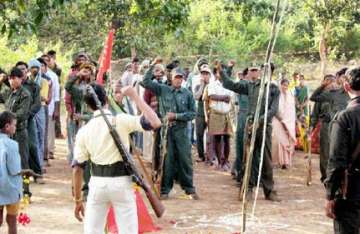Though the arrest of six out of 14 politburo members of CPI (Maoist) in the past three years had already made a heavy dent, recent reports indicating differences between chief Ganapathi and senior leader Koteswar Rao alias Kishenji has made ripples down to the lower cadre, says a Times of India report.
Security agencies recently seized a number of documents, including correspondence between Ganapathi and Kishenji, showing that the differences had turned into ‘suspicion' between them over their individual security.
“The documents show that there are clear differences at the top over method of operations. It, in fact, corroborated what Kishenji's right-hand man Telugu Deepak told his interrogators in West Bengal,” said a senior security official. Deepak alias Venkateswara Reddy, a West Bengal state committee member, was arrested by the state police on March 2.
Besides stating how the top leaders were not sure about each other's actions amid facing heat from security forces across Naxal-infested states, Deepak had told cops how even the movement of politburo members had, of late, been compromised.
Referring to the seized documents, the official said the differences had occurred over the way Kishenji and his comrades in West Bengal, Jharkhand and Bihar were associating themselves with the Lalgarh resistance as against Ganapathi's idea of taking on security forces simultaneously in different states.
CPI (Maoist) — which came into existence after the merger of People's War Group (PWG), active in Andhra Pradesh, Orissa and Chhattisgarh, with the West Bengal-Bihar-Jharkhand centred Maoist and Communist Centre (MCC) in 2004 — is now facing pulls from different sides.
While one group led by Kishenji wants to dominate Lalgarh considering it the centre of their resistance, the other led by Ganapathi feel the West Bengal unit is excessively obsessed with local politics. Though both Kishenji and Ganapathi were with PWG in Andhra Pradesh, security agencies found that the former now seems to be more interested in the affairs of the northern parts having its nerve centre in West Bengal and Jharkhand.
The MCC and PWG groups within CPI (Maoist) also differ on the methods of operation. Differences had cropped up in the wake of beheading of Jharkhand police inspector Francis Indwar last year. While erstwhile MCC leaders had justified such action, ex-PWG cadres had objected to the killing. Besides, erstwhile PWG members are finding it tough to deal with MCC leaders who are divided on caste lines.
“The security forces are now trying to use these differences as an opportunity to break the cadre,” a security official said.
Latest India News
